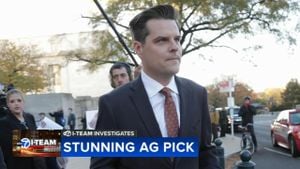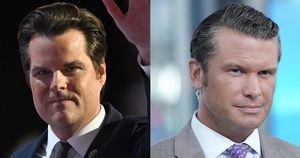After years of troubling revelations, the Church of England stands at a crossroads, grappling with the fallout from its handling of abuse allegations and the unexpected resignation of Archbishop Justin Welby. This moment has been marked by calls for transparency, accountability, and, most urgently, justice for the victims. Jayne Ozanne, known for her advocacy within the church, has described the situation as merely the "tip of the iceberg." According to her, many cases of abuse have been suppressed over the years for the supposed good of the church.
Ms. Ozanne’s remarks resonate deeply following the release of the Makin report, which detailed decades of abuse perpetrated by John Smyth, who was not only known as a barrister but also led Christian camps where he inflicted severe physical and emotional harm on young boys. This report, presented to churches as early as 1982, emphasized how leaders within the Church participated actively in covering up these atrocities instead of addressing them. Such actions, as the report indicates, resulted in creating cycles of abuse and victimization on too large a scale.
"This is just the tip of the iceberg, there are many other abusers out there," Ozanne insisted, emphasizing the need for systemic change within the church. This urgent call for reform has been echoed by various church leaders who are horrified by how the church has historically handled such sensitive matters. Leadership figures like the Very Reverend Mike Keirle, Dean of Jersey, have openly criticized the church's inadequate responses and urged for the church to listen more closely to survivors.
Meanwhile, pressures have mounted for a reevaluation of how religious authorities manage safeguarding measures. Individuals like Julie Conalty, Bishop of Birkenhead, have expressed concern about the culture within the institution, which still allows for the possibility of abuse continuing unchecked. She has been vocal in stating, "We are not putting victims and survivors at the center... we are not a safe institution." The clarity with which these leaders are speaking reflects the wide consensus: the Church of England must prioritize healing over tradition.
Welby’s resignation, viewed as necessary by many, sparked debates around accountability within church leadership. He himself voiced sorrow over the historical failures of safeguarding within the church. His decision, he claimed, was made "in sorrow with all victims and survivors of abuse" and was meant to prompt serious reflection on the part of ecclesiastical authorities.
The discontent surrounding his administration highlights not only the immediate issues but also the broader, more insidious culture of silence and complicity. Many have pointed out the irony of the Church’s role, which is supposed to provide sanctuary and safety, but, instead, has left many vulnerable. Such failures have understandably led to frustrations from survivors who have long endured the effects of neglect.
Across decades and continents, Smyth's legacy is tragic and far-reaching. His actions, characterized by trauma on multiple levels—physical, sexual, psychological, and emotional—have left permanent scars on many lives. Smyth passed away under mysterious circumstances, evading justice during his lifetime; yet his victims are seeking to change the narrative around accountability now.
Calls for sweeping reforms within the church are growing louder as patrons and churchgoers alike demand transparency and accountability for those currently serving and for predecessors who failed to act. Makin’s review indicated safeguarding protocols and reporting mechanisms need to be significantly strengthened, warning against the complacency which allowed Smyth to continue operating largely unscathed for years.
Health Secretary Wes Streeting, identifying as part of the Anglican community, has underscored the need for serious introspection and reform within the church. He asserted, "One head rolling solves the problem" is not enough to remedy what's occurred. Ensuring protections for victims must be at the forefront of the church's mission moving forward.
Currently, the Church is left with the task of identifying new leadership, with Stephen Cottrell serving as the temporary leader. Potential successors include notable figures, yet, as they assume their roles, the pressing question remains: how will the Church restore faith and offer genuine remediation to those harmed?
This moment can either be transformational or another missed opportunity to address deeply rooted issues of abuse and power within ecclesiastical structures. With pressure mounting from both within and outside the church, leaders must rise not just to examine their past but also to construct viable pathways for safeguarding the future of the Church of England and its community.



